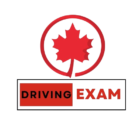Canadian Driving Test Practice — Prepare for Your Written Test Online
Ready to earn your driver’s license? At DrivingExams.ca, you can practice free Canadian driving test questions for every province and territory. Our practice tests are designed to look and feel just like the real exam — helping you master traffic signs, road rules, and safe driving habits before your actual test day.
- Trusted
- Experienced
- Professional

About Us
Who Are We?
We are Driving Exam Canada, your trusted partner for driving test preparation in Canada. Our comprehensive materials and practice tests for the sign test and the written test cater to learners from all provinces. With our easy-to-understand test prep resources, passing your driving test will be a breeze!


Our Mission
Our mission is to provide top-notch driving test preparation materials and practice tests to help newcomers and existing residents of Canada successfully pass their driving tests.
#Driving Exam
Why Choose Us?
Extensive Test Prep Materials
Our learning materials cover all aspects of the driving test, including sign tests and written tests.
Province-Specific Resources
Our resources are tailored to the unique driving rules and regulations of each province in Canada.
Continually Updated Content
We keep our content up to date with the latest changes in driving laws and test patterns.
Accessible Anytime, Anywhere
Access our resources at your convenience from the comforts of your home or on the go!

How It Works
We make preparing for your written driving test simple:
- Choose your province to access the right practice test.
- Take the online quizzes — questions are multiple-choice and similar to the real exam.
- Get instant feedback after every question to help you learn faster.
- Retry anytime until you feel fully ready for your official test.
No downloads, no sign-ups — just free, effective test preparation.
Testimonials
Hear From Our Successful Learners
Gearing up for the Driving Test:
An Action Guide
What’s Included in Our Practice Tests
Each provincial test includes: Road signs and their meanings. Rules of the road. Driving safety and best practices. Real exam-style multiple-choice questions. Progress tracking and instant results. Our goal is to help every Canadian learner driver feel confident and prepared before taking the real written test.
Frequently Asked Questions
1. Are these practice tests free?
Yes! All practice tests on DrivingExams.ca are completely free with no sign-up required.
2. Are the questions similar to the real test?
Yes. Each set of questions is based on your province’s official driver’s handbook and designed to mirror the real exam format.
3. Can I use this website on my phone or tablet?
Absolutely. DrivingExams.ca works perfectly on all devices, so you can study anytime, anywhere.
4. How do I know which test I should take?
Select your province from our homepage — each page is customized with practice tests specific to that region.
